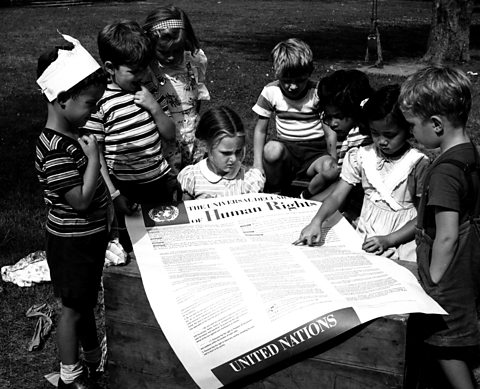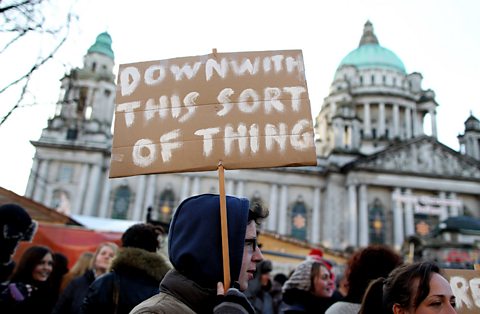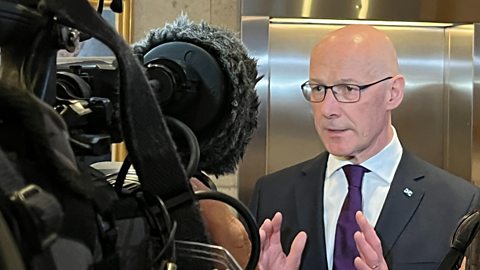What rights and responsibilities do people have in Scotland?
Quick version
In Scotland (and the UK) our human rights are protected by the Human Rights Act 1998.
- individuals who feel their rights have been breached can take a case to Scots and UK courts
- public bodies must work to uphold individuals' rights
- new laws passed by the Scottish Parliament must comply with the act
Rights are balanced by responsibilities - this helps protect everyone's rights
- right to vote is balanced by responsibility to accept the result of democratic elections
- right to freedom of speech is balanced by responsibility to not hateful or derogatory language
- right to protest is balanced by responsibility to keep within the law
Video - Rights and responsibilities
Watch this video on the rights and responsibilities of people living in the UK.
Rights and responsibilities
The Human Rights Act of 1998 sets out the rights and freedoms of everyone in the UK.
Alongside our own rights, we must be aware of our responsibilities to protect the human rights of others.
So everyone has the right to life but this is balanced by the responsibility not to harm or endanger other people's lives.
And we have the right to protection from discrimination balanced by the responsibility not to discriminate against each other.
In the UK, we all have the right to speak freely about all topics in society, including voicing criticism or support for the government.
But it is our responsibility to not use hateful or derogatory language about an individual or group in society.
Everyone in the UK has the right to express their views in a number of different ways, from joining pressure groups, unions or political parties to signing petitions, marching on the street, and sharing views online and in person.
There are some differences in the rights and responsibilities we have in Scotland as opposed to the rest of the UK.
In Scotland, everyone over 16 years of age and who is on the electoral register has the right to vote in local council and Scottish Parliament elections and referenda.
But voters must be over 18 years of age to take part in UK Parliament elections.
Wherever they live, all voters have the responsibility to accept the election results, even if they disagree with the outcome.
Learn in more depth
What are human rights?
Every person in the world is entitled to certain rights from the moment they are born until they die. These human rights make sure you are treated with:
- dignity
- fairness
- equality
- respect
Although everyone in the world has these same rights, many people live in places where their rights are restricted.
What is the Universal Declaration of Human Rights?

In 1948, the UN General Assembly produced the Universal Declaration of Human Rights.
This sets out the human rights that every person in the world is (in theory) entitled to.
These rights are protected by international laws, treaties and conventions, which have been signed up to by the UK.
The Scottish Parliament, Government and institutions all have to consider their responsibilities to international human rights when making decisions on devolved matters.

What is the Human Rights Act 1998?
Across the UK, human rights have legal protection through the Human Rights Act 1998.
The act protects rights in three ways:
All human rights set out in the European Convention on Human Rights have been incorporated into UK laws.
- If someone feels their human rights have been breached, they can pursue their case through Scottish or UK courts
- The European Court of Human Rights in Strasbourg has the final say on whether a case in the UK complies with the Human Rights Act
All public organisations, eg government, councils, courts, police, must act in compliance with the Human Rights Act
All new laws proposed, including through the Scottish Parliament, must be compatible with the Human Rights Act
What rights and responsibilities do people in Scotland have?
The political rights people in Scotland have are balanced by responsibilities. Some of these responsibilities are there to ensure that other people's rights are upheld. Some are extra responsibilities people take on to be part of particular groups or organisations:
| Rights | Responsibilities |
|---|---|
| The right to vote - In Scotland, everyone over 16 years of age and who is on the electoral register can vote in local council and Scottish Parliament elections and referenda. | People in Scotland have the responsibility to accept election results, even if they disagree with the outcome. |
| The right to freedom of speech - In Scotland, everyone has the right to speak freely about all topics in society. This includes voicing criticism or support for the government. | People in Scotland have the responsibility to refrain from using hateful or derogatory language about an individual or group in society. |
| The right to protest - In Scotland, everyone can show their views in a number of different ways - from joining pressure groups to signing petitions to marching on the street and sharing views online and in person. | People in Scotland have the responsibility to keep within the law, avoid violence or intimidation and take part in any protest using peaceful methods. |
| Freedom of association - In Scotland, people can join a political party, pressure group or trade union. | People in Scotland have the responsibility to pay their fees to the organisation and to ensure they do not damage the group's name through poor language or behaviour. |
Quiz
Recap what you have learned
The UK has signed up to the United Nations' Universal Declaration of Human Rights.
- this affects both reserved and devolved matters
- Scottish institutions have to consider international human rights when making decisions on devolved matters
In Scotland (and the UK) our human rights are protected by the Human Rights Act 1998.
- individuals who feel their rights have been breached can take a case to Scots and UK courts
- public bodies must work to uphold individuals' rights
- new laws passed by the Scottish Parliament must comply with the act
The rights people in Scotland have are balanced by responsibilities to ensure that other people's rights are upheld.
| Rights | Responsibilities |
|---|---|
| right to vote | accept the result of democratic elections |
| right to freedom of speech | refrain from using hateful or derogatory language about an individual or group in society |
| right to protest | keep within the law, avoid violence or intimidation and protest using peaceful methods |
| freedom of association | pay membership fees and do not damage the group's name through poor language or behaviour |
More on Democracy in Scotland
Find out more by working through a topic
- count9 of 18

- count10 of 18
